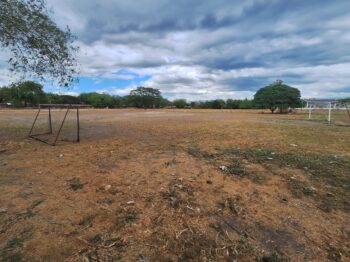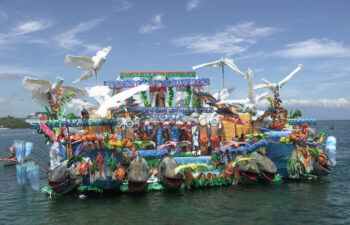
ROME (MindaNews / 21 September) — On September 15, 2021 the Pre-Trial Chamber of the International Criminal Court gave authorization to the Office of the Prosecutor to launch a full investigation on the charge of crimes against humanity for mass murder in the Philippines from November 1, 2011 to March 19, 2019. This time-frame covers not only from July 2016 to March 2019 during the presidency of Rodrigo Duterte but also from November 2011 to June 2016 when he was vice-mayor and mayor of Davao City. This is a source of rejoicing not only for the families of victims and civil society but especially for us who for over twenty years have been documenting and denouncing the extrajudicial killings that started in Davao and later spread throughout the entire Philippines.
When I was still in Davao and later in exile after the assassination attempt against me, I didn’t expect that this day would come. Our efforts to hold accountable those responsible for the mass murder have not been in vain after all. Justice will prevail no matter how long it takes.
What is even unexpected is the inclusion of extrajudicial killings in Davao from 2011 to 2016. When the ICC prosecutor Fatou Bensouda announced the opening of preliminary examination on the situation in the Philippines in 2018 the focus on the extrajudicial killings in the course of the War on Drugs initiated by Duterte since July 2016. Before the May 2016 elections, I posted in my blog an article on “The Victims of the Davao Death Squad (DDS): 1998-2015.” I warned:
“the families of victims cry out for justice as the DDS continue their killing spree. The national government has failed to address this mass murder that could soon multiply many times over, God forbid. If the DDS is not stopped and those behind it are not held accountable, there will be a nation-wide bloodbath. Those who support extrajudicial killings and allow it to multiply will have blood in their hands – they will be accomplices to mass murder. The one who order this is a mass murderer – the biggest Criminal of them all.”
This article went viral and was included in the information submitted by Atty. Jude Sabio to the International Criminal Court in 2017. When Bensouda began the preliminary examination, I thought that what I wrote which was a summary-analysis of the documentation by the Coalition Against Summary Execution would not be relevant to the case since these killings took place before 2016. It would just be background material although I insisted later that the subsequent killings were replication of the Davao template at a grander scale. I had an inkling that Davao would be included in the investigation after all after reading the report submitted by Bensouda to the Pre-Trial Chamber in June 2021. There was a reference to my article in the footnotes. Any investigation on Extrajudicial Killings from 2016-2019 will have to include what happened before. The past is prologue. Every story has a beginning. The story does not begin when Duterte became president of the Philippines. It started when he became mayor of Davao City in 1988. The connection between the killings during the War on Drugs in 2016-2019 and the earlier killings in Davao has been noted by the pre-trial chamber in par 24 & 25:
“24. The Prosecutor avers that information obtained by the Prosecution suggests that state actors, primarily members of the Philippine security forces, killed thousands of suspected drug users and other civilians during official law enforcement operations. According to the Prosecutor, markedly similar crimes were committed outside official police operations, reportedly by so-called ‘vigilantes’, although information suggests that some vigilantes were in fact police officers, while others were private citizens recruited, coordinated, and paid by police to kill civilians. The Prosecutor estimates the total number of civilians killed in connection with the so-called ‘war on drugs’ campaign between July 2016 and March 2019 appears to be between 12,000 and 30,000.
- In addition, the Prosecutor submits that ‘[t]he same types of actors also allegedly committed strikingly similar crimes in the city and region of Davao (“Davao”), starting in 1988 and continuing through 2016’. Bearing in mind the temporal jurisdiction of the Court, the Prosecutor What appears revealing is when the prosecutor observes that the “same type of actors also allegedly committed strikingly similar crimes in the city and region of Davao (“Davao”), starting in 1988 and continuing through 2016.” The prosecutor requests that ‘the 2011-2016 events in Davao be included within the requested investigation.’”
Reading between the lines this obviously refers to Duterte who became mayor of Davao in 1988 and the Davao Death Squad (DDS). The explicit reference to DDS is mentioned in later paragraphs:
“the Prosecutor submits that ‘[e]xtrajudicial killings which closely resemble the alleged [‘war on drugs’] killings in 2016-2019 were reportedly carried out in the Davao area (“Davao”) also before 1 July 2016’. In the submission of the Prosecutor, these killings were perpetrated by groups of local police officers and vigilantes, including the so-called ‘Davao Death Squad’, and that the majority of victims were young men suspected of involvement in small-scale drug dealing or minor crimes such as petty theft and drug use, while gang members and street children were also killed. The Prosecutor emphasizes that persons involved in these killings in some cases appear to the very same people that were later involved in the so-called ‘war on drugs’ campaign.“ (underscoring supplied).
The prosecutor is aware not just of the similarity between the killings under the War on Drugs in 2016-2019 and what happened in Davao since 1988 but also that these are committed by the same people (police and death squads). This reveals that a pattern has been detected and the key perpetrators have been identified – which include police personnel, the DDS and those behind them. Although the prosecutor notes that the killings started in 1988 – the year when Duterte became mayor, the scope of the investigation covers Nov. 2011 up to March 2019 when the Philippines was under ICC jurisdiction. The focus of the investigation of the Davao covers 2011-2016 when Duterte was vice-Mayor to his daughter Sara and when he became Mayor again (2013-2016). But this does not mean that what happened before 2011 will not be examined. The past is prologue. Or like the pandemic, one has to investigate when and where the virus started, how and who transmitted it. Davao is ground zero.
The inclusion of Davao in the ICC investigation makes the documentation by the Coalition Against Summary Execution (CASE) valuable. The consolidated report covers 1998 (ten years after the killings started) until 2015. It contains the names of the victims (1,424), their age, sex, brief narration on how they were killed, weapons used, the area & police district, etc. In the past, getting the families and neighbors of victims to testify was difficult because of fear. They were afraid of retaliation by the police and DDS. Only Clarita Alia whose four sons were killed was willing to share her story. But since they were killed before 2011, her testimony will not technically be accepted in the trial. There are 385 victims from 2011 to 2015 whose families need to be heard. While the Dutertes are in power and the DDS are still around they will be afraid to tell their stories which needs to be heard.
In the investigation of the Davao killings, the CASE documentation would not be sufficient. This gives the impression that the ICC has a weak case. But it can establish the fact that there are victims of EJK and their families and friend are crying for justice. Hopefully, when the time is ripe many of them will come out in the open.
The CASE assisted in the investigation of the DDS by UN Special Rapporteur Philip Alston, the Human Rights Watch and the Commission on Human Rights headed by Leila De Lima. While these investigations took place before 2011, the reports will probably not be regarded as direct evidence. But these reports prove the reality of EJK perpetrated by the DDS, the patterns and modus operandi, the actors involved, etc. The 64-page draft report and recommendations of Leila De Lima in 2009 based on the CHR investigation in Davao is particularly conclusive and damning especially regarding the involvement of Duterte and other police officials. There were testimonies of insiders, barangay officials, etc. Yet, President Gloria Macapagal-Arroyo did not act on it nor the report made public. The former president will have to be questioned about this. Was it because of politics? At one time, she even offered Duterte the post of secretary of the Department of Interior and Local Government (DILG). The testimony of Leila de Lima will be valuable. She also has to explain why as DOJ secretary under President Noynoy Aquino from 2010 to 2015 she did not pursue the case. Why was the CHR recommendation released by Loretta Rosales in 2012 not carried out?
In another way, the inclusion of the Davao killings strengthens the case of crimes against humanity for mass murder against Duterte and his minions especially during 2016 to 2019.
Without this inclusion, the testimonies of Edgar Matobato, Arthur Lascanas and the third key witness (a former DDS hitman whose identity remains a secret) would be inadmissible as evidence. The testimonies of these witnesses who were part of the DDS since its inception and even during the scope of the investigation directly link Duterte to the mass murder. They can attest to these facts: (1) That Duterte formed the DDS in 1988, (2) that he ordered the killings, (3) that he funded their operation and that (4) he also pulled the trigger a number of times.
These key witnesses have personal knowledge and confirm the finding of previous investigations by the Human Rights Watch and the Commission on Human Rights on how the DDS operates, the link with the police, the source of funding. Besides the intel fund, one of the sources of funding was the budget for 11,000 ghost-employees of City Hall which was flagged by the Commission on Audit (COA) in 2011 when Sara Duterte was mayor. Sara will have to answer the following questions: (1) why did she not investigate and put a stop to the EJK that continued during her term? (2) why did she not do anything to stop the “ghost employee” anomaly which funded the DDS operations? Those close to Duterte will have to be investigated about their knowledge or their role in the DDS operations – including Bong Go (his special assistant) and Jun Evasco (his closest adviser and strategist since 1988). The role of Duterte’s son (Paolo) also have to be investigated since his name has been mentioned by the key witnesses.
These witnesses also revealed how the DDS developed – from a group referred to as Lambada Boys, Mayor’s Squad, then Heinous Crimes Investigation Section and later integrated secretly into each police station under operational command and control of the station chiefs (this was already the case in 2011-2015). One should bear in mind that Ronald dela Rosa was Davao Police chief when Sara Duterte was mayor. Around this time, he introduced Operation Tokhang which later became the template of Operation Double Barrel when Du30 became president.
In July 2016, when Duterte took office, key PNP (Philippine National Police) officers assigned in Davao were immediately transferred to Metro-Manila and other major urban centers. And so also were the civilian vigilantes who were part of the DDS. The “Davao Boys” were relied on for carrying out the War on Drugs and for replicating the Davao template. The nationwide bloodbath started which claimed the lives of over 30,000 Filipinos.
Duterte and his spokespersons and lawyer publicly declare that the ICC case is weak since the evidence are based on hearsay, news reports and his public statements. They make it appear that without the cooperation of the Philippine government it will not prosper and remain dormant. That there is no evidence that directly links Duterte to the Davao Death Squad and extrajudicial killings since he became president.
What has been made public is the redacted version of the prosecutor’s report as well as the official authorization from the Pre-Trial Chamber. But this is just the tip of the iceberg. Fatou Bensouda before stepping down made sure that the available evidence – the documentation and key witnesses – are safe and secure. Karim Khan, the new prosecutor was in the Philippines four years ago for a series of seminars upon the invitation of the CHR. He knows the situation very well.
Duterte is aware that his days are numbered. He is panicking because he knows that he cannot escape the judgment of the ICC. That is why he wants to run for Vice President and is encouraging his faithful assistant (Bong Go) or his daughter to run for president. But this is all in vain. Besides being uncovered as a plunderer in the senate investigation, he is being accused of being a mass murderer. Davao is exhibit A. The past is catching up with him.
(MindaViews is the opinion section of MindaNews. Fr. Amado L. Picardal, CSsR is Executive Co-Secretary of the Commission for Justice, Peace and Integrity of Creation of the Union of Superiors General (USG-UISG) in Rome. A native of Iligan City, Fr. Picx lived and worked in Davao City from 1995 to 2011 and was assigned to Manila where he served as Executive Secretary of the Catholic Bishops Conference of the Philippines Basic Ecclesial Communities Committee from 2011 to 2017. He went around the Philippines several times on bike or on foot, for peace and justice).







